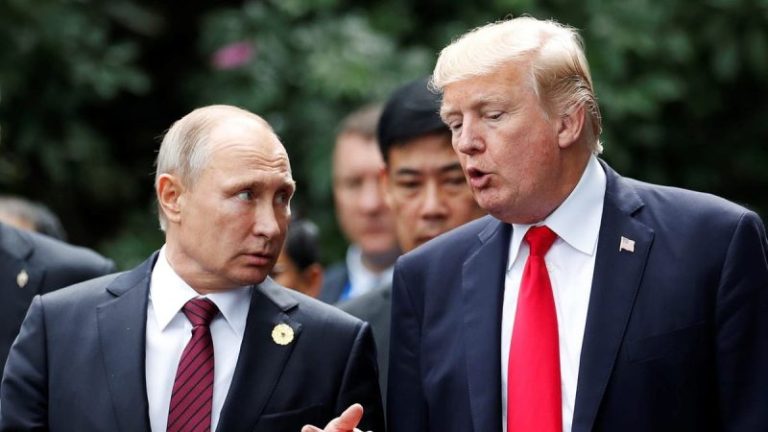President Donald Trump’s approach with Russian President Vladimir Putin pivoted drastically this month when, for the first time since returning to the White House, he not only confirmed his support for Ukraine in a NATO arms agreement but issued an ultimatum to the Kremlin chief.
The warning came in a clear message: Enter into a peace deal with Ukraine or face stiff international sanctions on its top commodity, oil sales.
While the move has been championed by some, it has been questioned by others who debate whether it will be enough to deter Putin’s war ambitions in Ukraine. One security expert is arguing the plan will work, but it might take years to be effective.
‘I think it will be effective, and he’s going to stick to that strategy. He’s going to continue to push Putin to return to the bargaining table and negotiate in good faith, not come to the bargaining table, make promises that the Russians don’t plan on keeping,’ Fred Fleitz, who served as a deputy assistant to Trump and chief of staff of the National Security Council during the president’s first term, told Fox News Digital.
‘That’s something Trump’s not going to tolerate,’ Fleitz added. ‘We will see this is just the first six months of the Trump presidency. This may take a couple of years to solve.’
But Trump campaigned on ending the wars in Ukraine and Gaza, which has proven to be more complicated than he suggested from the campaign trail. And not everyone in the Republican Party has backed his approach when it comes to Europe, including a staunch Trump supporter, Rep. Marjorie Taylor Greene.
‘We do not want to give or sell weapons to Ukraine or be involved in any foreign wars or continue the never-ending flow of foreign aid,’ Greene said on X. ‘We want to solve our own problems plaguing our own people.’
Fleitz pointed to Trump’s decision to directly strike Iran and argued it reflected Trump’s ability to be nimble as a leader.
‘He looked at the intelligence and realized it was getting too close, and he decided to adjust his policy, which was first diplomacy,’ Fleitz said.
‘But Trump also specified something very important. He said to his supporters, ‘I came up with a concept of the America-first approach to U.S. national security, and I decide what’s in it,’ Fleitz added. ‘He has ownership of this approach, and he will adjust if necessary.’
Though Trump had made clear from the campaign trail that he wanted to see Europe take a leading role in the war in Ukraine, last week he countered a major talking point from some within his party, including Vice President JD Vance.
Vance has argued against arming Ukraine and said in an op-ed last year, ‘[It] is not just a matter of dollars. Fundamentally, we lack the capacity to manufacture the amount of weapons Ukraine needs us to supply to win the war.’
Trump agreed to sell NATO nations top U.S. arms that will then be supplied to Ukraine.
‘We want to defend our country. But, ultimately, having a strong Europe is a very good thing,’ Trump said, sitting alongside NATO Secretary General Mark Rutte.
Security experts have largely argued that the future of Ukraine’s negotiating ability and, ultimately, the end of the war, will play out on the battlefield.
On Thursday, John Hardie, deputy director of FDD’s Russia Program, told U.S. lawmakers on the Helsinki Commission, also known as the Commission on Security and Cooperation in Europe, in a defense briefing that Ukraine needs to be supplied with long-range strike capabilities that can hit key Russian missile and drone plants.
‘Ukraine shouldn’t be restricted merely to shooting down ‘arrows’,’ Hardie said. ‘An optimal approach will combine both offense and defense. Ukraine needs to be able to hit the ‘archer’ and the factories that make the ‘arrows.’
‘Putin will continue his unprovoked war so long as he believes it’s sustainable and offers a pathway to achieving his goals,’ Hardie argued. ‘By shoring up Ukraine’s defense of its skies and enabling Ukraine to inflict growing costs on Russia’s war machine, as well as pressuring the Russian economy and exhausting Russia’s offensive potential on the ground, we may be able to change that calculus.’
But Fleitz, who serves as vice chair of the America First Policy Institute’s Center for American Security, said he believes this war will only be brought to an end when an armistice agreement is secured.
‘I think there’s probably going to be an armistice where both sides will agree to suspend the fighting,’ Fleitz said. ‘Someday, we will find a line where both nations will agree to stop fighting.’
Ultimately, he believes this will happen by Ukraine agreeing not to join NATO for a certain period of time, though with Moscow’s understanding that Kyiv will be heavily armed by Western allies.
‘I think there’s a way to do this where Russia wouldn’t be concerned about growing Western European influence in Ukraine, and Ukraine would not be worried that Russia will invade once a ceasefire or armistice is declared,’ he added. ‘Maybe this is a pipe dream, but I think that’s the most realistic way to stop the fighting.
‘We know from history conflicts like this take time; peacemaking takes time,’ Fleitz said. ‘I think that over time, Trump is going to have an effect on Putin.’


